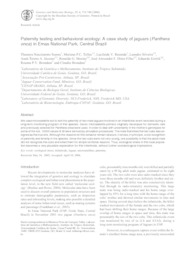Paternity testing and behavioral ecology: a case study of jaguars (Panthera onca) in Emas National Park, Central Brazil.
Paternity testing and behavioral ecology: a case study of jaguars (Panthera onca) in Emas National Park, Central Brazil.
Author(s): SOARES, T. N.; TELLES, M. P. C.; RESENDE, L. V.; SILVEIRA, L.; JÁCOMO, A. T. A.; MORATO, R. G.; DINIZ-FILHO, J. A. F.; EIZIRIK, E.; BRONDANI, R. P. V.; BRONDANI, C.
Summary: We used microsatellite loci to test the paternity of two male jaguars involved in an infanticide event recorded during a long-term monitoring program of this species. Seven microsatellite primers originally developed for domestic cats and previously selected for Panthera oncawere used. In order to deal with uncertainty in the mother?s genotypes for some of the loci, 10000 values of Wwere derived by simulation procedures. The male that killed the two cubs was assigned as the true sire. Although the reasons for this behavior remain obscure, it shows, in principle, a low recognition of paternity and kinship in the species. Since the two cubs were not very young, one possibility is that the adult male did not recognize the cubs and killed them for simple territorial reasons. Thus, ecological stress in this local population becomes a very plausible explanation for this infanticide, without further sociobiological implications.
Publication year: 2006
Types of publication: Journal article
Unit: Embrapa Rice & Beans
Keywords: Ecological stress, Infanticide, Jaguar, Microsatellites, paternity
Observation
Some of Embrapa's publications are published as ePub files. To read them, use or download one of the following free software options to your computer or mobile device. Android: Google Play Books; IOS: iBooks; Windows and Linux: Calibre.
Access other publications
Access the Agricultural Research Database (BDPA) to consult Embrapa's full library collection and records.
Visit Embrapa Bookstore to purchase books and other publications sold by Embrapa.

